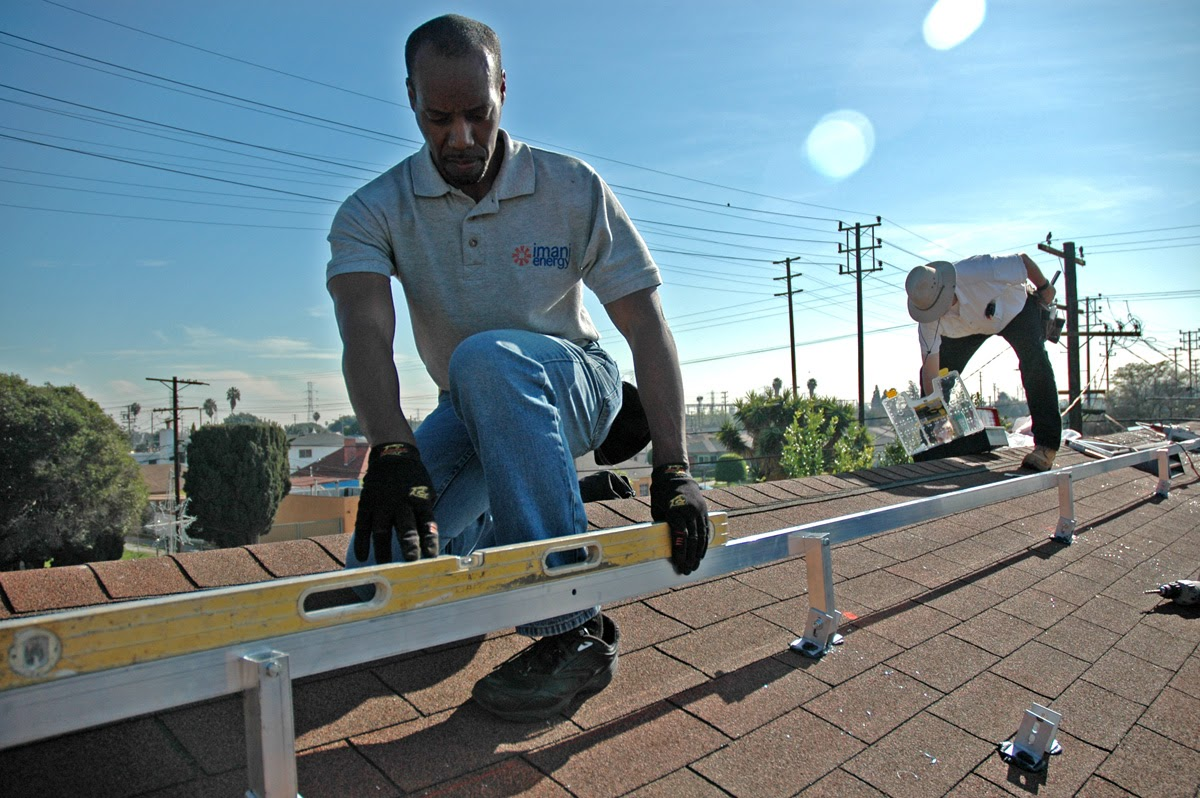
Imani Energy, Inc. Powers Social Change Through Roof-Top Solar
By Rebecca Shipman, [email protected]
Jeffery Richardson grew up in Pittsburgh's predominantly Black Homewood-Brushton neighborhood in the 1960s. During his childhood, he saw his mother’s deep-rooted commitment to her community as she worked as a social worker, he watched his father march on Washington, and understood the change both were rallying for. He entered college during the time of the Black Power Movement, and began his activism in student organizations. Richardson participated in the Free South Africa movement, Housing Now, and Jobs with Peace.
He worked in community economic relief and development in Washington, D.C., leading fundraising, managerial, and training programs for the National Congress for Community Economic Development, a national trade association for low-income people of color before moving to Los Angeles to do labor organizing. There, he directed a component of the largest union organizing effort of a predominantly African-American workforce in the nation’s history for the Service Employees International Union (SEIU) in Los Angeles. He learned the principles of organizing from some of our country’s greatest leaders and saw from very early on how environmental injustices played a role in other civil issues in America.
Throughout his career, Richardson has continually asked himself, “What are the key issues of the time?” and then formulated a plan for how to fix it. So when doing business development with a solar company in 2006, the connection was clear; “[Solar was] an opportunity because we were focusing on jobs, education, reducing the cost of electricity, and saving the environment.”
Richardson founded Imani Energy, Inc. in California in 2008 to connect communities of color to private sector energy to provide education and generate wealth within these communities to help create a better quality of life. Imani Energy’s model is to help customers find practical ways of financing their move to solar through grants and tax incentives.
The “Imani” in Imani Energy means faith and is based on the Kwanzaa principle–faith in the future and in the desire of most of the people, most of the time, to do that which is fair, honest, just and healing for our world. Their first solar power system was installed for an organization called A New Way of Life which helps formerly incarcerated women make the transition from prison back to their families and communities.
From early on, Richardson saw solar as a place for people of color to leverage their resources as producers in the green economy. Richardson explains, “It is about solar and creating jobs, it is about cleaning the environment, but it is also about transforming how we see ourselves in the world and how we see other human beings.” Imani Energy is actively recruiting people of color into the solar workforce, which matters because in the US only 12% of people in the industry are Black. Aside from community education, Imani Energy has tied project development and training workforce together. Imani Energy pioneered solar sales training with the Los Angeles Community College District to help people in transition gain skills to position themselves for solar industry jobs.
Richardson describes the promotion of people of color in solar as “a chance to address how we define environmentalism”. He points out that racism, economics, and environmentalism have always intertwined since the beginning of this country when colonizers took land that belonged to Native communities. They brought African people to the Americas to exploit the land for white profit. Again and again, throughout U.S. history Black people have been looked at as a commodity to be exploited. Imani Energy uses the historical context to fight the system. “To talk about ownership in a country that owned your people, it turns this whole thing upside down,” says Richardson.
In 2013, Richardson moved to Delaware, bringing Imani Energy with him and helping the company expand nationally. Richardson appreciated the opportunity to reintroduce his work and partner with new community organizations. Imani Energy is one of the community partners in the Eastside Rising Development project located in East Wilmington which has grown out of a comprehensive community plan and the vision of the Central Baptist Community Development Corporation. Imani will provide solar sales training and management and coordination of solar installations associated with the project. In addition to local organizations, Imani has formed relationships with large solar manufacturers and installers allowing for Imani to develop larger projects.
Recently, Imani has formed a collaboration with Delaware Interfaith Power and Light, which has 22 member congregations that have made a commitment to the care-taking of Creation. They work with a range of partners on projects such as church energy audits and the Heat Health Warning System and leverage their energy efficiency program experience and the solar expertise of Imani Energy to bring savings, environmental benefits, and green jobs to communities.
In the face of the undeniable effects of climate change, Richardson says he is excited about the ‘period of awakening’ we are in. “I can’t overemphasize the crisis we are in, but I also cannot overemphasize the magnificence of people who are fighting for change”.

